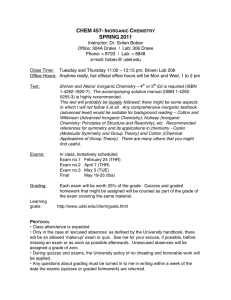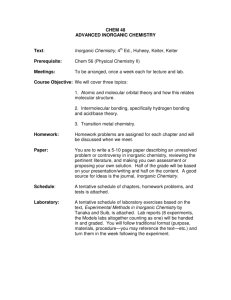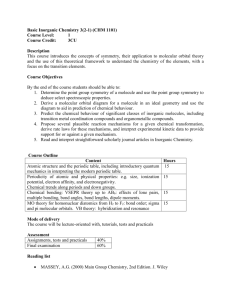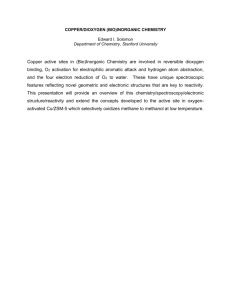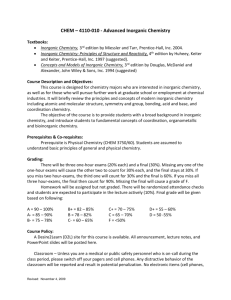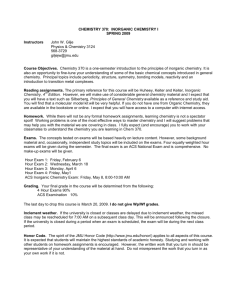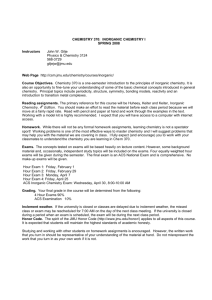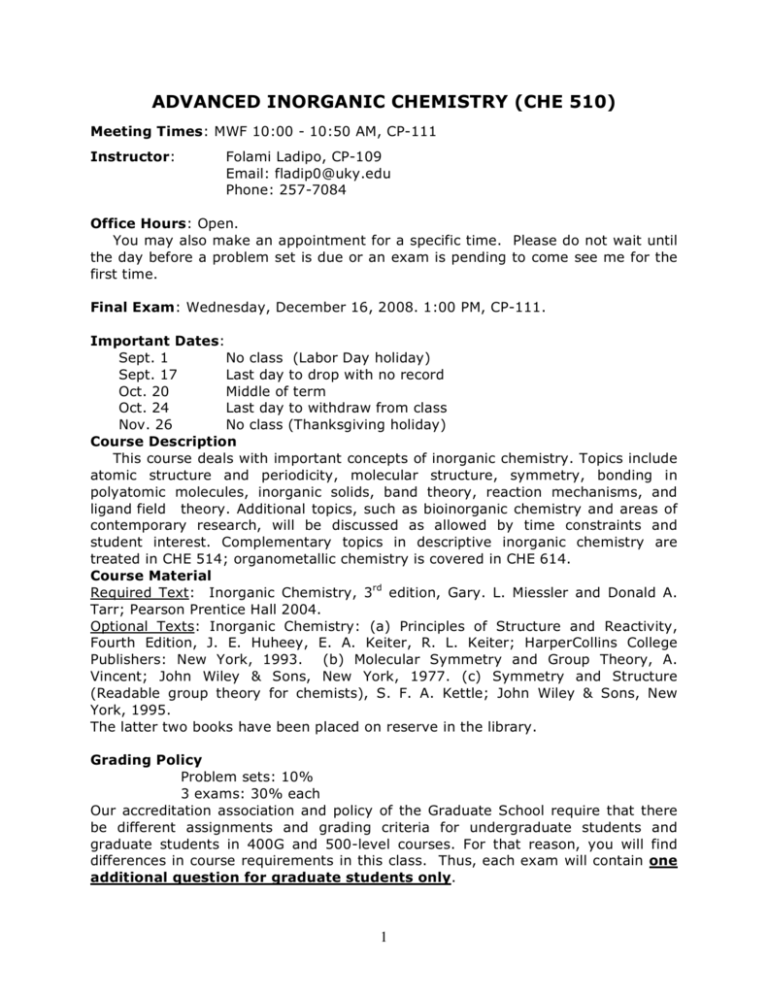
ADVANCED INORGANIC CHEMISTRY (CHE 510)
Meeting Times: MWF 10:00 - 10:50 AM, CP-111
Instructor:
Folami Ladipo, CP-109
Email: fladip0@uky.edu
Phone: 257-7084
Office Hours: Open.
You may also make an appointment for a specific time. Please do not wait until
the day before a problem set is due or an exam is pending to come see me for the
first time.
Final Exam: Wednesday, December 16, 2008. 1:00 PM, CP-111.
Important Dates:
Sept. 1
No class (Labor Day holiday)
Sept. 17
Last day to drop with no record
Oct. 20
Middle of term
Oct. 24
Last day to withdraw from class
Nov. 26
No class (Thanksgiving holiday)
Course Description
This course deals with important concepts of inorganic chemistry. Topics include
atomic structure and periodicity, molecular structure, symmetry, bonding in
polyatomic molecules, inorganic solids, band theory, reaction mechanisms, and
ligand field theory. Additional topics, such as bioinorganic chemistry and areas of
contemporary research, will be discussed as allowed by time constraints and
student interest. Complementary topics in descriptive inorganic chemistry are
treated in CHE 514; organometallic chemistry is covered in CHE 614.
Course Material
Required Text: Inorganic Chemistry, 3rd edition, Gary. L. Miessler and Donald A.
Tarr; Pearson Prentice Hall 2004.
Optional Texts: Inorganic Chemistry: (a) Principles of Structure and Reactivity,
Fourth Edition, J. E. Huheey, E. A. Keiter, R. L. Keiter; HarperCollins College
Publishers: New York, 1993. (b) Molecular Symmetry and Group Theory, A.
Vincent; John Wiley & Sons, New York, 1977. (c) Symmetry and Structure
(Readable group theory for chemists), S. F. A. Kettle; John Wiley & Sons, New
York, 1995.
The latter two books have been placed on reserve in the library.
Grading Policy
Problem sets: 10%
3 exams: 30% each
Our accreditation association and policy of the Graduate School require that there
be different assignments and grading criteria for undergraduate students and
graduate students in 400G and 500-level courses. For that reason, you will find
differences in course requirements in this class. Thus, each exam will contain one
additional question for graduate students only.
1
The final assignment of letter grades will be based approximately on the following
schedule:
A= 90+
B= 80+,
C= 70+,
D= 60+
E = <60
I reserve the right to raise or lower these divisions depending on the difficulty of
exams and where breaks in the distribution occur. Grades are assigned on the basis
of student performance, not proportions; in other words, students are not competing
against each other for grades, and I am quite happy to give most of the class A's
and B's if the class has earned them.
Examinations
Examinations will be given on 10/8/08 and 11/19/08. These two exams will
be evening exams, starting at 7:00 PM. Students may take up to 3 hours to finish
the exam. The final exam will not be comprehensive but the questions will draw
heavily concepts developed earlier in the course.
Problem Sets
Answer keys to the problem sets assigned in the duration of this course will be
made available on the web. Problem sets will be graded and returned during
the semester. A good effort in class and on the homework will work to
your advantage if you aim to do well on examinations. The problem sets are
specifically designed to elaborate on ideas already taught in class and are therefore
a test of your ability to assimilate and apply new concepts. Problem sets will only
be graded after all examinations are completed and only if you fall between grades.
Academic Integrity
Academic integrity is covered in the handbook “Student Rights and
Responsibilities” which all of you should have received (if not, consult the chemistry
office). Possible penalties for academic offenses (cheating on exams etc.) range
from an "E" for the course (the minimum penalty!) to expulsion from the University.
Attendance
I strongly recommend that you exercise good judgment.
Attendance is
reflective of the effort you put forth in the class and will be considered when
assigning grades especially if you are on a borderline between grades.
Course Coverage
(Tentative) Readings for the course from Miessler and Tarr will include chapters
2-12 but not necessarily in this order. Readings outside the scope of the text will
be assigned periodically; these readings will be made available on reserve at the
library.
Finally, learning is an interactive process. If I have not made a point clear it is
your responsibility to let me know. Ask questions. Ask why. There are no stupid
questions except for the ones you didn't ask because you were afraid of looking
stupid. Classroom participation is a key element in this class and can influence your
grade.
2

